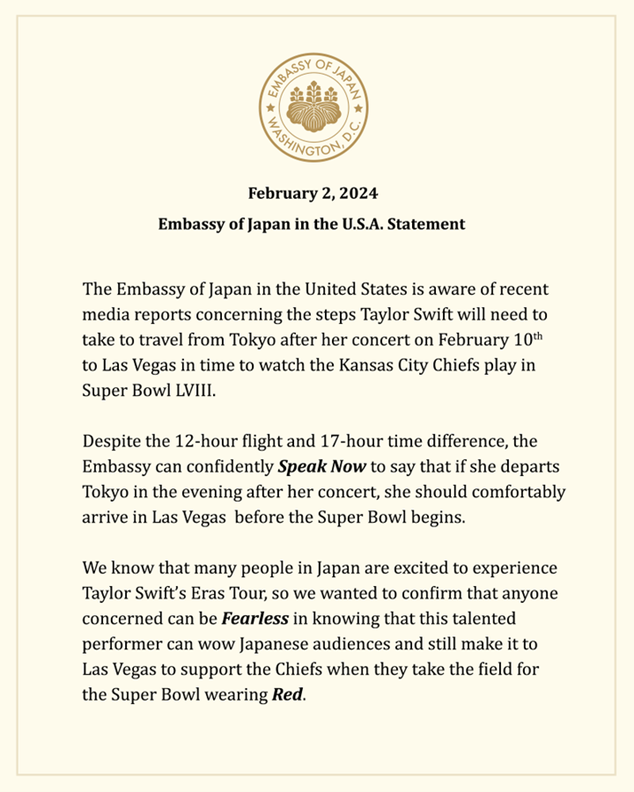Have you ever had someone care about your well being more than their own?
On Taylor Swift’s recent trip (February 7-10, 2024) to Tokyo for her Eras Tour, there was speculation about whether she could perform the final show of her Tokyo concert and still make it to Las Vegas in time to celebrate and cheer on her boyfriend, Travis Kelce’s Kansas City Chiefs in the Superbowl. On social media, there was widespread concern and calculation about the logistic of her travels.
On February 2, 2024, the Embassy of Japan in the USA released a statement confirming that Taylor Swift would be able to both perform at her final concert in Tokyo and arrive in Las Vegas in time for the big game. In an homage to Taylor Swift fans, The Embassy of Japan incorporated the titles of some of Taylor Swift songs into the body of the official statement.

Just like the Japanese Embassy wrote lyrical references to connect with Taylor Swift; Taylor Swift spoke Japanese phrases to connect with her adoring Japanese fans.
With all the challenges currently facing the world, why did the Japanese Embassy feel that making an official statement on this matter was so important?
I believe that it reflects Japanese culture. As much as Japanese fans were looking forward to celebrating with Taylor Swift at her concert, they would not be able to fully enjoy the concert knowing that their own pleasure would preclude Taylor from celebrating Travis Kelce’s athletic achievements. While the Tokyo Eras concert would be a “once in a lifetime” celebration for the Japanese fans, missing her boyfriend’s Super Bowl appearance would potentially be a “once in a lifetime” disappointment to Taylor. Accordingly, the Japanese Embassy prepared all the logistics necessary to enable Taylor Swift to both celebrate her Japanese audiences in Tokyo and celebrate as part of the Super Bowl audience in Las Vegas as well.
The double blessings of both Japanese fans enjoying the Taylor Swift concert and being able to wish her luck and great joyful sendoff to Taylor for her journey back to Las Vegas brought an even greater jubilation to the Japanese fans.
In her final encore, Taylor shouted to the audience “Do you have time for one more song!?” Members of the audience near the front of the stage yelled back: ”Taylor, we have time, but do you?” The Japanese fans did not want to cause any complications for Taylor’s Travels.
I looked to the Torah to find a comparable example of looking out for the welfare at other’s, even at one’s own expense.
In Genesis, Joseph’s brothers came to Egypt to plead with Joseph for food for Canaan due to the famine. After a lifetime of the brothers persecuting Joseph which ultimately resulted in the brothers selling Joseph into slavery. Joseph’s disappearance created two separate negative situations: the brothers lied to Jacob and told him that Joseph was killed by a lion and showed his bloody colored coat. Jacob mourned for the rest of the years in his life. In addition, Joseph was sent as slave to Egypt and ended up in jail.
….Now for the double joy / double blessing…
In Genesis 44:2 Joseph secretly placed a silver goblet in the bag of Benjamin (his true blood brother by their same birth mother Rachel).
When Joseph “searched” the bags of the brothers and “found” that Benjamin had “stolen” the silver cup, he pronounced that Benjamin would not be able to leave and needed to remain as a slave in Egypt.
Judah then stated. I cannot imagine the pain that our father would experience knowing that both his sons would be gone – Joseph by death many years ago and now losing Benjamin.
Judah pleaded. Please take me as your servant instead of Benjamin. At this very moment, Joseph realized that his brothers had changed.
Judah was no longer of the philosophy of “I am not my brother’s keeper” from Genesis 4:9 when G-d asked Cain, “Where is Abel your brother?” and he answered, “I do not know. Am I my brother’s keeper?” knowing full well that he had killed Abel.
In the beginning, Judah and his brothers tormented Joseph and their father, Jacob, with no sense of shame or remorse.
In that moment of offering to switch slavery places with Benjamin to both protect Benjamin from harm and his father, Jacob, from further grief, Judah demonstrated his transformation from a bellicose and bullying brother to a sensitive sibling seeking spiritual harmony for Benjamin and his father, Jacob, and truly seeing the impact of selling Joseph into slavery.
Joseph then revealed his true identity to the brothers, and they had a full family reunion and reconciliation, and Jacob’s heart was healed and fulfilled.
Seeking the goodness for others at one’s one expense can bring double joy and double blessings.
I hope that you too can experience double joy and blessings during this additional gift of time and celebration of the double Adar of this Leap Year.





